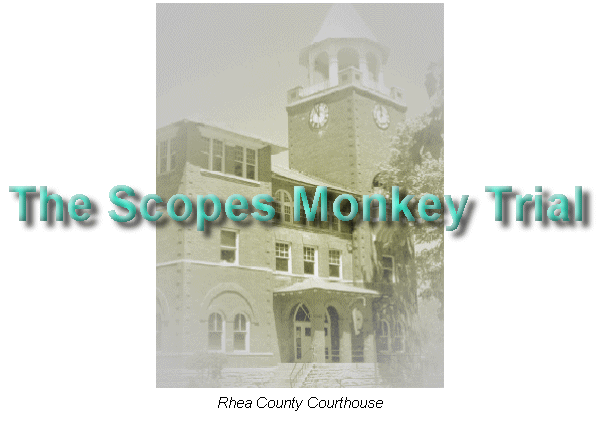Introduction
A brief description of the Scopes Trial - the original proceedings, the effective fictionalising of the event in F.L. Allen's book Only Yesterday, and the confusion surrounding the play Inherit the Wind. Also a list of books relevant to this subject, and a short biography of the author.
Part 1: Summary
A short history of the events leading up to the Scopes Trial, the trial itself, and what happened afterwards. Includes lists of the lawyers, witnesses, jurors, etc. involved in the Scopes Trial. Explains why it was called the "Monkey" trial.
Part 2: Inherit the Wind
Looks at the real story behind the writing of the play Inherit the Wind, and some of the key differences between the play and the actual trial. Explains where the title came from, and what it signifies.
Part 3: A Cult of Misinformation
The Scopes Trial has been the subject of a mountain of misinformation from the time of the trial through to the present day. The members of this "cult" include not just journalists and authors but also lawyers, university professors, the Encyclopaedia Britannica and even the Library of Congress. This section shows why the real life events are so widely misunderstood today.
Part 4: How it Began
Discusses the Butler Act (the basis for the charge against John Scopes), the action of the ACLU, the "Drug Store Conspiracy" which led to the trial being staged in Dayton, and how the two sets of lawyers were selected - or in some cases selected themselves. This section includes the names of all of the lawyers on both sides.
Part 5: The Experts - and Others
Details of the expert witnesses due to give evidence for the defense - and two potential witnesses, one of whom did make an appearance (Piltdown Man), and one who didn't (Nebraska Man).
Part 6: The Expert Evidence
Arthur Hays claimed that the expert witnesses would deal only in "facts." This section discusses specific items of "expert testimony" in the light of that claim and subsequent discoveries.
Part 7: Hunter's Civic Biology
Details of the true nature of the contents of Hunter's textbook A Civic Biology.
Part 8: The Trial - Part 1 In preparation
A timeline of the main events of the trial on a day-by-day basis.
Part 9: The Trial - Part 2
A detailed evaluation of the confrontation between Darrow and Bryan on the afternoon of day 7, with numerous quotes from the trial transcript and elsewhere.
Part 10: The Appeal
Many people know that the Tennessee Supreme Court overturned the original result of the trial, but why? Was John Scopes found "not guilty"? What reasons did the Supreme Court give for their decision?
And what the heck is a nolle prosequi anyway?
Part 11: Was Scopes Guilty?
Another remarkable feature of the Scopes Trial was the number of lies involved - the biggest of which centers on the likelihood that the defense lawyers deliberately concealed the fact that Scopes was genuinely "not guilty."
Part 12: 80 Years of Evolution and Species
(Under Construction. Additional material will be added. Existing material may be subject to further editing.)
In Part 6 we looked at the kind of "evidence" offered by the expert witnesses. In this section we look specifically at the meaning of terms such as "evolution" and "species" in 1925 and 2006.
Part 13: Education After the Scopes Trial
This section describes what happened to the teaching of evolutionary theory in American schools after the trial; and what Americans believe about the teaching of evolutionism and creationism today.
Part 14: Clarence Darrow - Attorney for the Damned?
Whilst the ACLU triggered the Scopes Trial, and the "drugstore conspirators" brought it to Dayton, the guiding force behind the events during the trial itself was Clarence Darrow. This section looks at what motivated Darrow to essentially hi-jack the ACLU campaign and use it for his own ends.
Part 15: The Significance of the Scopes Trial
This section considers some of the many clashes in American society in the 1920s and considers whether they were genuine clashes, and if they were, what influence the Scopes Trial had an on any of them.
It also reveals what will be, for many people, surprising new information about the role of the University of Chicago in American culture at that time uncovered by Professor of the History of Science, Edward Davis.
Part 16: The Play, the Movie and the Trial
(Under Construction. Additional material will be added. Existing material may be subject to further editing.)
A detailed examination of the differences between the play and first film version of Inherit the Wind, and the real life Scopes Trial.
Part 20: Links and Resources
A list of websites and books related to the Scopes Trial, including the trial transcript and the script of Inherit the Wind.

